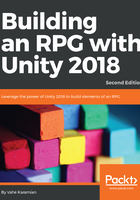
上QQ阅读APP看书,第一时间看更新
Terminology
Every discipline has its own terminology. The following is a list of terminology that is used in RPG games. It is a good idea to take a moment and study them, to expand your vocabulary or to refresh your memory:
- Attribute: A gauge that is a common characteristic, a commonality.
- Character: A person in a game portrayed by a player, including, possibly, the Game Master.
- Characteristics: An aspect of a character. A character's name, height, age, beauty, and strength are some possible characteristics.
- Common Characteristics: Characteristics common to all characters of a given type in a game. A character's name, height, age, beauty, and strength are frequently common characteristics.
- Conflict: Contention between characters, players, and/or game forces, especially contention that shapes the game's plot. This includes oppositions between two or more players concerning what facts should be introduced into a game world.
- Contest: A conflict that is resolved through mechanical means.
- Derived Attributes: An attribute whose value is determined by a formula. Typically, the formula uses other attribute values to generate a number.
- Drama: an outcome-based purely on story consideration. Outcomes in a drama are exclusively determined by what would be most entertaining for the participants.
- Flaw: a selected characteristic that is specifically not also a gauge. A character either has a flaw or he does not. Flaws are structurally very similar to gifts. But, flaws are generally considered detrimental to a character rather than beneficial.
- Fortune: An outcome that is at least partly based on random factors. This may include rolling dice, drawing cards, or some other random value generator.
- Game Master: Traditionally, a player assigned responsibilities to manage the game flow. With computer RPGs, the Game Master (GM) is the glue that holds everything together.
- Gauge: A graduated value generally associated with a name. Commonly the graduated values are numeric values.
- Gift: A selected characteristic that is specifically not a gauge. A character either has a gift or not. In general, gifts are considered beneficial to a character's well-being.
- Karma: An outcome based on non-random value comparison. A karma-based contest directly compares two values to determine an outcome.
- Non-Player Character (NPC): Any character portrayed by the Game Master as part of the role.
- Optional Characteristics: A characteristic that is not common to all characters of a given type.
- Player: Any person participating in a role-playing game.
- Player Character (PC): a character portrayed by any player while not assuming the role of a Game Master.
- Primary Attribute: An attribute whose value is set directly by a player rather than being derived by a formula from other attributes. Commonly, primary attributes are used in formulas to determine the values of Derived Attributes, but their own values are not determined by formulas. Typically, they are generated by random numbers or set by spending some resources.
- Rank: The specific value of a gauge skill, handicap, or ranked trait. Also used as an adjective in place of gauge when describing such skills and traits.
- Ranked Trait: A trait that is also a gauge.
- Selected Characteristic: A characteristic selected from a pre-defined list of choices.
- Shared Gauge: A gauge that is shared by many characters.
- Skill: A selected characteristic that is also a gauge and is generally considered beneficial to a character.
- Trait: A characteristic made up by a player without drawing it from a pre-defined list of choices.
To get a better understanding about the relationships between the attributes and characteristics, we have put together a visual help explain it:
